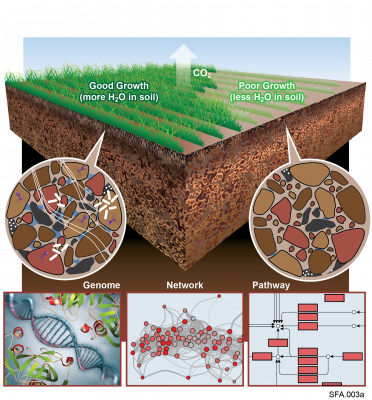Abstract
Microbial response to changing environmental factors influences the fate of soil organic carbon, and drought has been shown to affect microbial metabolism and respiration. We hypothesized that the access of microbes to different carbon pools in response to dry–rewet events occurs sequentially at different rates. We amended desiccated soils with 13C-labeled glucose and measured the rates of 12CO2 and 13CO2 respiration in real time after rewetting. Using these differentiated 12CO2 and 13CO2 respiration rate soils after rewetting, we were able to deduce when microbes are accessing different pools of carbon. Immediately upon rewetting, respiration of 12CO2 occurred first, with negligible 13CO2 respiration. Appreciable metabolism and respiration of the added 13C glucose did not occur until 15 min after rewetting. We conclude that, while all carbon pools are being accessed in the first 9 h after rewetting, the rate and timing at which new and existing carbon pools are being accessed varies. Within this study, using stable isotope-labeled substrates to discern which carbon pools are metabolized first uniquely illustrates how microorganisms access different carbon pools which has implications into understanding how carbon metabolism can further affect climate, carbon sequestration, and soil health.
Projects (1)
The Phenotypic Response of the Soil Microbiome to Environmental Perturbations Project (Soil Microbiome SFA) at Pacific Northwest National Laboratory is a Genomic Sciences Program Science Focus Area (SFA) Project operating under the Environmental Microbiome Science Research Area. The Soil Microbiome...
Datasets
45

